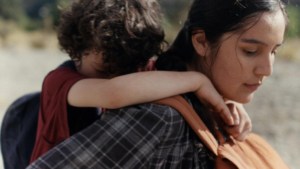A winner at Atlanta’s Out On Film festival earlier this year, Melissa Fisher’s Buscando Alma is a film that charts acceptance and the power of love in an entirely new way. If you are close to your mother or any parental figure, how much of a void would you physically feel if you didn’t know when you would see them again? For some, losing a parent in an emotional way only enhances the pain or loss of that figure not being that. Fisher has created a queer film of specific loss and longing, but its huge heart makes this a universal story.
We meet two women who yearn for a reconnection. Cristina, a young Honduran immigrant, searches for her mother, Alma, since they were separated nearly two decades ago. At times, the hunt seems hopeless, and, at the same time, Cristina fears that her mother will not accept her since she has now transitioned. Does a mother’s instinct keep two people tethered?
“I always give credit to Andy Marra and her podcast, The Birth Dream, and I highly recommend everyone listens to it–it’s gorgeous,” Fisher says. “Andy was adopted at birth and traveled to Korea to meet her birth family and, similarly, is trans, so she was trying to figure out not only how to find her birth parents but also how to present herself to them. She ponders how and if they will accept her, and her story has a beautiful ending. Not only did she immediately embrace Andy, but she told her that her being trans wasn’t a problem. She recognized Andy as her child, and she didn’t question anything. Coming from a fairly strict religious upbringing, I found some of my own struggles in her tory, and I realized how universal art can be in terms of connecting our communities with more compassion. I hope our film can touch people in a similar way that Andy’s story touched mine.”
Carolina Gutierrez gives Cristina such a palpable confusion. It’s like her Cristina is reaching around in the dark for the thing she knows she needs the most, but she can’t quite find it.

“My mom is my entire universe,” Gutierrez, who plays Cristina, says. “I could go on and on about how important my mom has been throughout my entire life, and I talk to her every day. Even though my mom’s always been present, I was not always able to be present with her as myself. As a trans woman, I hid for many years for fear of rejection or retaliation, and I felt that, for almost twenty years, so similar to my character in the film. In the moment that I told my mom, she literally embraced me, and it took a hundred pounds off my shoulders. I felt like I could be muself for the first time in my life after my mom could finally see me. My love for her only gew stronger and bigger.
I wanted to make sure to do my due diligence and listen to Andy’s podcast to get more acquainted with Cristina’s immigrant story as well. So many people are separated from their parents or they lose one another, and I wanted to know what that meant. As an immigrant myself, I was lucky enough that I was able to stay with my mom throughout the process. Our journey to the United States was relatively easy before the 9/11 attacks. I have so much empathy for my Latino community and my trans community, and that embracec from a mother or parent is so important.”
I commented that one of my favorite things about the film was how Alma didn’t question her Cristina’s presence. It’s a feeling that I never questioned, because I could tell that these characters would recognize each other’s heart and spirits. Not everyone thought the reunion would be as smooth as it is portrayed in the film.
“I think that speaks a lot to our culture or the kinds of stories that we digest or have come to expect,” Fisher reveals. “People wonder if it’s realistic that Alma would know who Cristina is. I got that question even in the editing process, and they wondered if it was believable. For me, it’s important to see stories like this in order to change the narrative, and that instant acceptance was really important in telling this story. I think that’s why the film has been so lovingly received.”
These characters share the memory of being separated when they cross into the United States, but how do they each remember the incident? Since Cristina was so young, are her memories skewed? Has Alma repeated them so much in her mind that she focuses on specific details? The memory is volatile and alive for both women, but Fisher made sure to give those glimpses a distinct look and feel.
“From a filmmaking standpoint, it was definitely a collaboration between my cinematographer, my editor, and myself to try and figure out how to interweve those perspectives most effectively,” Fisher says. “One thing that I was very excited about was the use of the prism that was used as a way to transition in and out of memory, especially from Cristina’s perspective that show that her memories of her mother aren’t alway perfect. They are a little fragmented. With the prism, you get this kind of double image which gives us a sense of duality of either her two lives past and present or her two genders. Cristina’s perspective when she’s remembering back on her mother is that it’s not always crystal clear. When we showcase it more from Alma’s perspective, like when we transition from the laundromat into the desert, it’s usually always clearer, and we tried to do those perfect match cuts in the edit. It was a big question of how we edit it cinematically in the most effectie way. Jean-Marc Vallée was a big reference of that fragemented memory. I am a big fan of his work.”

“I keep using the word ‘cosmical,’ because that’s what I keep telling Melissa that I feel that has led us to here with this film,” Gutierrez says. “I dream a lot, and a lot of my core memories come from when I was 14 and living in Colombia before my transition. Everything pre-transition is in my brain, so I feel like, for Cristina, that memory where she gets separated from Alma, is very much locked in her mind.”
“The way in which Alma and Cristina remember things is probably a little diffferent, too,” Fisher adds. “The memory of a child versus the recollection of an adult is something we wanted to show as well.”
Faith drives both of these women. We see Alma praying in church, and even though we may not see Cristina praying in a religious sense, she is hoping for a solution and a happy reunion. Fisher’s main mission was to deliver compassion in a world determined to snuff it out. However you believe, there is nothing stronger than the determination of a mother looking to protect and love her child.
“My father is actually a minister, and that has shaped who I am as a person and who I am as an artist,” Fisher says. “I am still a very spiritual person, but I think there ha been a need in my mind to establish a woman like Alma whose heart does live in a place of Catholocism and yet wholeheartedlt accepts her daughter. We need more of that, and that was inspirted by Andy and her podcast. It adds stakes within the story, too, and I think audiences love Alma from the moment we see her in the laundromat at the beginning. We feel her desperation to find her child, so it was also a way for us to interlay some stakes that she might not accept Cristina when they eventually find one another. From a thematic standpoint, it was important for me to see more compassion.”
“Like Alma, my mother is a very devoted, Catholic woman,” Gutierrez reveals. “She will sometimes go to prayer during the week, and I will have to make sure that I don’t call her when she’s doing that. I have a collection of four rosaries that my mother has gifted me which is another thing that I told Melissa was a symbol of their union.”
“I learned my values from my Christian upbringing,” Fisher says. “We are living in a society where certain rhetorics are being divided where you can either be a religious person or you can be accepting and compassionate. They are the same thing, and that’s why I have such a heart for this story.”









